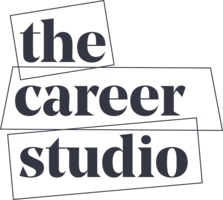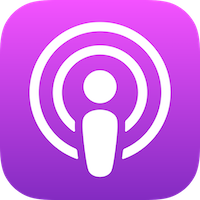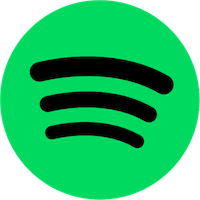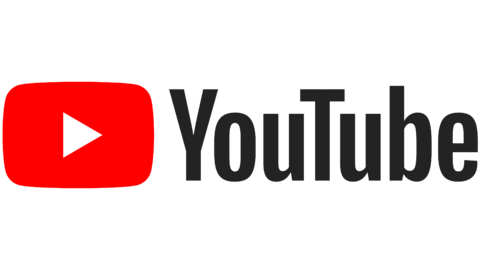Don't update your resume
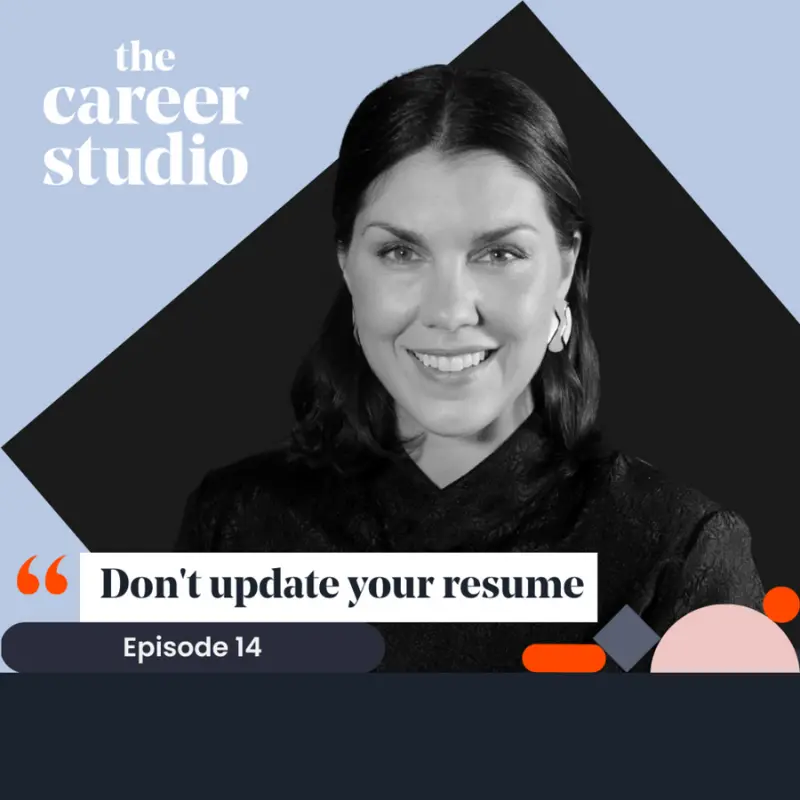
The natural place to start when you feel like you might want a new job is to head over to a job board and start scanning opening roles or open up that old resume and start adding new information. But this is the wrong place to start if you’re feeling lost professionally. It’s likely to cause you to spin out into a black hole of despair as you send your applications out and wait to hear back.
There is a much more effective, informative, and energizing way to spend your time if you’re feeling lost professionally. Join me as I walk you through the approach I take all my clients through to go from confusion to clarity.
In this episode I cover.
- Why updating your resume is the wrong place to start
- The statistics behind applying to jobs online
- What to spend your time doing instead of job applications (and why and how this works)
Related episode
Are you ready to create an energizing career you love?
You can create a career that is simply an extension of who you are and how you want to live your life. If this sounds like what you’re after then schedule a consultation. We'll get to the bottom of what's going on for you. And exactly where you need to focus to bring your career and life into alignment. It's free!
For more from The Career Studio
Transcript
Welcome to the career studio podcast, where we boil down the noise and focus on the core concepts, essential for building an energizing career you love. One that is simply an extension of who you are and how you wanna live your life. Anyone can do it. It's just a matter of knowing what to focus on.
Hello, how are you? It feels kind of weird to ask that to someone who can't answer, but I hope you're doing well. It's been a beautiful few days here in New York. It's almost like we've mostly escaped the fierce winters that we normally have. I'm touching wood because now I'm gonna get slapped in the face with a winter storm, but it's really been a nice winter here, very sunny the past few weeks, and I feel very grateful.
And I haven't necessarily talked about it that much on the podcast, but if you follow me on other channels on my LinkedIn or in my emails, you'll know that I was pretty burned out at the start of the year. I kind of got to Costa Rica and I realized that, I, yeah I'd overdone it on all the stuff that I enjoy doing.
I'd kind of overextended myself, and so I have really been saying no to almost everything that isn't critical. Besides serving my clients and supporting my clients, I've said no to almost all the other activity that's required to run my business. I've just been mostly recycling old content. And saying no to a lot of social engagements and yeah, just getting lots of sleep and hanging out at home and filling up my tank on excellent Netflix programs and really good books. And yeah, I'm kind of coming out the other side now, six weeks later, feeling a lot more energized, a lot more motivated to do things like strategic planning or producing content or developing ideas for new initiatives.
So yeah, I'm feeling really energized and grateful for the mild winter. And uh, yeah, that is the energy from which I'm recording the podcast today. So, Today I wanted to come on and talk about, I think I'm gonna call this, this episode; don't update your resume , because what I wanted to talk about is basically that, how, you know, one of the biggest mistakes I see people making when they feel lost or bored professionally is going to doing a bunch of stuff that actually isn't gonna help them.
Make a really intentional and aligned next step. And the actions I see people taking are around updating their resume and applying to jobs or going on LinkedIn and scanning jobs or going to Indeed and looking for postings. And this can feel really good, right? Cuz it feels like we're taking action in some way, right?
So we might spend hours updating our resume, or maybe we'll even hire someone to update our resume and like make it look pretty and make it talk about us in an impressive way. Or we'll spend hours scanning job postings, looking for something that looks interesting, writing a cover letter, sending out that snazzy new resume.
This feels productive. Like we are fixing our situation like we're taking action. But if you've done this, or perhaps you're in the midst of doing it,now, you know that this is basically a black hole of despair. And these actions in very few cases lead to something worthwhile because actually these job postings, so few of them are actually read by humans.
I think the stat is only 2% of applications to jobs posted online arr ever read by human eyes, right? If you're ,as someone who's hired through LinkedIn, I have actually done that before. This was for a small business and I was the hiring manager. I had no support or really around me to review applications and to my posting in, I don't know, a week, 10 days, I probably got 500 applications and I was honestly only able to review about 200 of them, and that took a lot out of me.
And I just picked from the 200 I, I just chose the ones that looked the best and then I went from there and those people got very lucky. And when I say, when I gave you that stat, right, only 2% are read by human eyes, when you think about a large multinational that's recruiting, a lot of those are just read by AI.
They're scanned for keywords or certain criteria, so it's, it's very, very hard to get through these screenings if you are just simply applying and waiting to hear back. Plus the other reason that this doesn't really work, the other reason that I'm talking about this is because if you're feeling lost professionally, how do you know what jobs to look for?
How do you know how to update your cv? Because you, you haven't been doing any of the work required to figure out what would be the best next step for updating your resume, applying to jobs. It's like you're going to the end of the process without having done the process. Okay, so there's kind of two big issues.
It's where everyone starts. It feels like, oh, I know I'll just, I'll just start looking at jobs on LinkedIn. But it's totally wasted energy. Not only are you not clear on where you're going, But you're applying into a black box. You're applying into a, a worm hole where you're never gonna see your application again.
Okay? So the issue is this. When you feel lost, don't update your resume. Don't immediately go to a job board and start scanning for opportunities. Instead, you wanna start talking to people. Lots and lots and lots of people. and I did a whole episode on people when I launched the podcast, but like no one listened to it.
It has like half the amount of listens as every other one of my podcasts and, and who knows why that is. Maybe it just got hidden when I launched cuz I launched with a couple episodes at once. Or maybe people are scared. Of this topic, right? People don't like the idea. When I say talk to people, talk to lots and lots and lots of people, I think people have a negative reaction, which I'm gonna talk about.
But the reason I say this, before I get into that, the reason I say talk to people is because people are literally the lifeblood of your career. They are going to guide you by answering your questions and your concerns, right? If you're feeling lost, the way that you're gonna figure out where you're going is by having conversations.
People are going to inspire you because if you're feeling lost, if you don't know what comes next, right? They're going to open your eyes to ideas you haven't even thought of. There's only so far you can get in your head with your own ideas, right? You're, if you're only using yourself, you're limited to your frame of reference.
You know, this is why working in a team is so important. This is why diversity is so important. Right. So when you don't talk to people, you are not making an informed decision. People also, obviously, they, they open doors by connecting you to people they know and ultimately when the time is right, recommending you.
You know, really who I work with are people who feel lost, who feel burned out, or demotivated professionally, and they're not sure what comes next. So if you are not sure what comes next, do not start updating your resume. Do not start scanning job postings as your first port of call. Instead, you wanna talk to people.
Because not that many people listened to my episode on people. I'm gonna just recap some of the points from that episode now on how to actually talk to people how to make this not scary. Because I guarantee you, when I say talk to people, talk to lots and lots and lots of people, there's some of you who are listening to me who are saying, oh my God, no, don't tell me to do that.
Some of the reactions to me saying that will be, Anne I, you know, I don't wanna waste people's time, right? I, I don't know what to say, right? What, what I even say to them, and I don't wanna waste their time. And, you know, it's, , if I ask for help, it's awkward and, and people are gonna judge me because it's gonna look like, I don't know, have my shit together.
I don't know where I'm going, and people aren't gonna wanna give up time in their busy schedule to talk to me. Right? That's almost like too big a favor to ask. Okay. So if, if those are your reactions, I hear you. Those are all really normal reactions and I'm going to counter all of them right now because those reactions that you're having, that's what's preventing you from figuring out where you wanna go.
Because as I said before, there's only so far you can get with your own brain and Google. Right. It's, it's really about people and having conversations, and I almost think I might do a whole series of episodes around this cornerstone and, and different points about how to do it because it really is so, so important.
So, okay, let me push back on all of your rebuttals, your disagreements with talking to people. So first, let me just reframe by saying you are not asking for a job. Right. I think a lot of people think that having conversations or networking, and I specifically don't like to use that word because it's so triggering for people, they have this really cringe association with a, you know, a networking event with a name tag and business cards and oh, it's all very nineties.
But you're not asking for a job if you're feeling lost, you have to have conversations because this is how you figure things out. So think about having conversations as you are exploring where to direct your career next, and you're having informational interviews. Okay? People forget about the step, the informational interviews, the conversations where you learn stuff. You're curious. You're not asking for anything except to understand. Except to learn. Okay, so you're not asking for a job. You're asking for time to ask questions and learn.
Okay? So if you're worried about wasting people's time, about taking up people's time, that people won't wanna talk to you, that it's too much to ask people to spend 20 or 30 minutes with you. Let me tell you this, we have evolved, as a species to cooperate and collaborate with each other. Right. We evolved in tribes and there's been many studies, but the one that sticks in my head that I like to talk about is the study where a group of people were given a hundred dollars and half of them were told, spend this money on yourself, and the other half were told, spend this money on someone else and the ones who spent the money on someone else felt better. They reported higher scores of happiness and wellbeing. And you're gonna be able to relate to this yourself, right? Think about any time that anyone has ever asked you for advice, right? And maybe they've even asked you for advice about your career, right? And, and how you built it and sharing your wisdom.
So the question is, how did you feel when you were asked? You probably felt honored. You probably were excited to share your hard won wisdom because we love talking about ourselves and it makes us feel good, like we made decisions that can be helpful and useful to other people if we're able to share our advice.
So remember this, people like talking about themselves and sharing their wisdom, okay? And they can always say no, People can always say no, and you don't have to make that mean anything about you, right? That maybe they don't have time or capacity to have a conversation right now. But I guarantee you if you ask people, especially if you ask people that you know or kind of know or connected to in some way, they will make time.
They will make 20 minutes to talk with you. Okay? So remember that two, a lot of people dunno what to say. Right, and I get that right. You, you do wanna be prepared, right? You wanna have questions, you know, you don't wanna waste people's time by not knowing what to say, but it's really very simple to know what to say, and I'm gonna tell you exactly how to do that now.
Make a list of any career idea you think is interesting? Anyone you think is doing something cool, anything you've ever thought of. Don't let your fears and insecurities stop you. Just write down any idea you've ever had. And then you ask yourself, what do I wanna know about this idea? Like, what are the questions that I would need to answer in order to figure out if this is a good fit for me or not?
Just whatever comes to mind. And then, and this is really important. All of your fears and concerns about the idea that would maybe not have you write it down to begin with, or make you write it off as not possible. Write those down. Write those down for the idea, and turn those into questions. Turn those into the questions that you ask, because this is how you explore your ideas.
This is how you actually get the information you need to make an informed decision. Better to have those conversations with people actually doing that thing and get the information and then make an informed decision than just to close the door because of something you are assuming without actually having done your research.
So do your research. Find out if your fears and concerns are legitimate or not. And then you can close the door for good if they are, right, and you can make that decision. But right now, if an idea keeps poking your brain, it's because you haven't actually explored it and you're just letting your fears get in the way, so you do know what to say. All right. Just do what I just said. And you'll have some questions. Okay.
The last concern I, I wanna talk about is this idea that, you know, people are gonna judge me. I don't wanna look stupid. Kind of this idea of I should have my shit together. People are going to not think well of me if I say I don't know what I'm doing professionally and I have questions. And so first I'll say when you're worried that other people will judge you, it's because you are judging yourself. That's your judgment cuz you don't know what other people think, right? So you're projected judgment of other people is really just your own judgment of yourself, okay? And you've created that judgment. Who knows how? But I think in our society there is definitely this kind of cult of individualism, and it's very common for people to think that they should be able to do it by themselves, right? Like smart people should be able to do it themselves. And I don't know this idea that being confused or lost means we've done it wrong.
Maybe, because I work with a lot of millennials and most of our parents mostly had one job for their whole career. Right. Kind of stayed in one lane where we are moving around much more. And so maybe there's an assumption that if we stray from what we were originally doing, that we've somehow messed up.
Okay. But I'm here to tell you that all of that's just bullshit. Don't judge yourself. It's totally normal to have inflection points in your career, and it's totally fine to feel lost. It's, it's good. It's normal, right? It means you're growing out of an old version of yourself and into someone new. And then if you are actually organized and intentional and vulnerable enough to go to someone and say, Hey. I'm at, at this inflection point, I'm exploring what comes next. I'd love to learn more about your career. I mean, this shows me someone who has their shit together and if someone 10 years, my junior came up to me and asked me that, Hey Anne, you know, I, I've been working in finance, but I'm miserable and I've always thought coaching was really interesting.
I have a couple questions. I'm, I'm exploring what I wanna do next, and I really wanna do this right? I really want to make an intentional, aligned decision. I'd love to talk to you about how you built your career in coaching, how you built your business. Do you have 20, 30 minutes for us to connect? I'd be like, this person has their shit together and is really mature.
Okay, so it's totally normal to feel lost, and if you are taking action through it, by having conversations, you are doing an exceptional job and you should be proud of yourself. So stop judging yourself. There's absolutely no reason to judge yourself for exploring what comes next.
Okay, so that's it. Basically, the point of this podcast is to tell you don't go to updating your resume and applying to jobs. This is something that comes much later. The first step, if you are feeling lost, if you do not know what you wanna do next, or if you have a couple ideas, but you're not sure, the first step is to have conversations.
Lots and lots and lots of conversations. And eventually through those conversations, you are going to find something that interests you, okay? And you're gonna be excited about it. Maybe you're gonna do a side project. and through that side project you're gonna meet people. But certainly through having conversations, you will have met a lot of people and then those people can help you because you've already built a relationship with them.
They can help you apply for jobs, right? They can help you get your foot in the door because you've already built a relationship with them. That's not about getting your foot in the door. You've built a relationship with them through your enthusiasm and interest about a topic that they're also interested in.
Okay? So. Only start applying to stuff once you actually know where you're going. And the only way to figure out where you're going when you feel lost is by having conversations. You know, I think the reason that we default to updating our resume and applying to jobs is just because it's action we can take by ourselves without interacting with another human.
And a lot of people get nervous about interacting with another human, but just go back and listen to my counterpoints, to all your fears and insecurities. And if talking to people feels uncomfortable, ask yourself why and write down whatever comes out. And those are your limiting beliefs. That is what is keeping you from this absolutely critical part of creating a career and a life that works for you.
And the last thing I'll say is this. After you've had lots and lots of conversations, you're also gonna know how to position yourself, which is gonna help you with your resume, which is gonna help you with your cover letter. Right. These are really box ticking exercises for HR, because once you have the relationship with someone, that's what's gonna get your application to the top of the pile, right?
The relationship is gonna help you get in front of the hiring manager instead of just applying through the Indeed Portal, the LinkedIn portal, which, you know, no one's ever gonna see. 2% are gonna be read by human eyes. So if you built the relationship because you've been talking to that person already about other stuff.
Your application is going to go straight to the right person and then you know, the resume, the cover letter, it's gonna be not that important because what's gonna be more important is that person's referral and recommendation for you. Yeah, I've been talking to Cecilia for a couple months. She's done a consulting project for me, or Yeah, I had a conversation with her. She seems really sharp. I think you should consider her for this position, right?
That's gonna go a really, really long way, further than any fancy formatting or keywords on your resume. So yeah, it's never about updating your resume, it's always about having conversations. Have an amazing week.
Hey, if you're ready to create an energizing career you love, one that is simply an extension of who you are and how you want to live your life. Then I wanna invite you to schedule a consultation. We'll get to the bottom of what's going on for you. And exactly where you need to focus to bring your career and life into alignment. It's free. Just head on over to thecareer.studio/schedule to find a time that works for you, or if you're enjoying and getting value from these episodes, I'd love you to leave a short review on whatever podcast app you use.
This helps other people like you find and get value from the podcast too.
